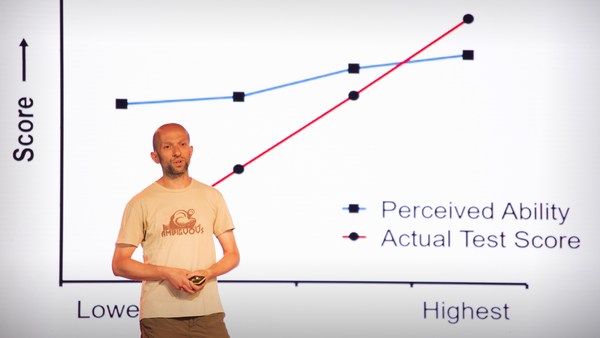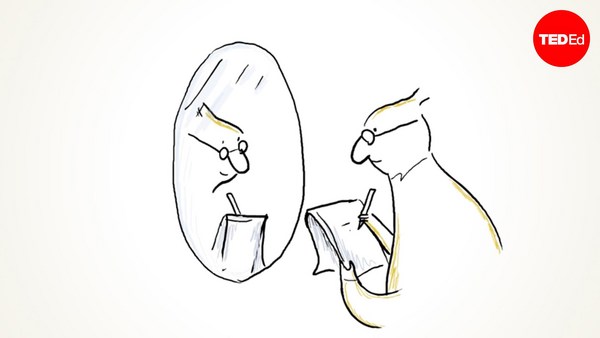I will always remember my son's first day of school. Lucas was five years old and he was going to kindergarten, and he was so excited. He was going to take the bus. and we were excited for him.
And I’ll never forget that day when I came home, I was eager to check in with him to hear, "How did it go?" And Lucas's response was, "Dad, I'm tired of hearing about hallway procedures."
(Laughter)
I found his response both amusing and sad. Amusing because I thought, oh my gosh, you have a lifetime of hallway procedures you're going to have to work through. And also amusing because it captured so well how schools and institutions can just grind us down with their bureaucratic rules and monotonous procedures. But I found it sad because this was his first day of school, and his takeaway on that very first day, was that school is boring. This is a boring place.
However, he's going to have to learn to deal with boredom. It's something we all learn to deal with. Boredom is a common and familiar problem. And I think at first it can seem like a trivial problem. If you're bored, just find something interesting, move on to the next thing. But actually, I’m going to argue that it’s far more complex. And that it needs our attention. And I'm going to offer three takeaways for how to contend with boredom well.
In schools, boredom is a big problem. An overwhelming majority of high school students report being bored in school. And this is a problem because when students are bored in school, they begin to lose interest, they can't focus. And when students are bored in school, they start to misbehave. I was a high school teacher, and if my students were bored, I was petrified because I was going to have problems. This was going to be a disaster. And if students are chronically bored year after year, eventually they just drop out and peel away from school altogether.
But boredom is not just a problem in schools. It's a problem that tracks us beyond schools. There are several troubling addictions that are linked to boredom. When we're bored, we drink too much, we eat too much, we spend too much money, we buy things we don't need. There are entire industries that are designed around making us bored. And so boredom has some really problematic behaviors linked to it, but even more than these troubling addictions, there are also these smaller things. The half-listening to friends and acquaintances when we’re bored. Or just the way we idle our time when we’re bored. I'm dating myself, but if I could take back the 10,000 hours I put into Tetris and put that into actually playing guitar, I'd be a professional musician right now. That was kind of a joke, anyway.
So, boredom is something we need to look at, and we look at boredom, we tend to think about it objectively. I’m bored by this teacher or I’m bored by this book I’m reading or this person I'm talking to. And boredom tends to objectify things and actually be quite judgmental and arrogant. That's a boring person, that's a boring book. But in truth, boredom is both objective and subjective. We're actually making a judgment call, deciding whether something is boring or not. And we know that what bores one person could actually be very interesting to another.
So in this respect, boredom is kind of a curious and perplexing mood state. What do we make of it? It's kind of like a dashboard light, when you're in your car and a light goes on and it gives you very clear directives. You need to get gas, you need to get oil, you need to put air in the tires. The problem with the boredom light is it goes on and there's no clear direction. We're not sure what to do with it, and most of the time we don't even notice the boredom dashboard light because it's going on all the time. It's kind of blinking and it just becomes white noise and we're dealing with it. We're dealing without even realizing it.
Day in and day out, we're constantly navigating away from boring spaces into interesting spaces. And how do we do this? There are two dominant ways that we've evolved to contend with this troubling mood state. On the one hand, you've got avoidance. So if I'm in a boring situation, the first move we make is, how do I get out of this? I can physically get out of this, or what do I do? I daydream. Or the most obvious thing we do is we check our phones. Our phones are these sophisticated boredom-avoidance devices.
And we avoid boredom because it’s actually painful. I don't know if you've ever felt the pain of boredom. The pain of boredom was illustrated in a recent study at the University of Virginia. They asked subjects to come into a room and just sit with their thoughts for 15 minutes. And these are folks that were 18 to 70. And they could do that, or they could put their finger in a machine and receive a painful shock. The results of the study were, pun intended, shocking: 30 percent of the women and 60 percent of the men chose to shock themselves rather than sit with their thoughts for 15 minutes. All of this is to say that we would rather have physical pain, many of us, than the pain of boredom. So avoidance is the common go-to way that we contend with it without even thinking about it, it's automatic.
The other strategy that we employ is resignation. You've perhaps heard grown-ups say to children when they complain of boredom, "That's life. Get used to it." And so the idea is that you just have to endure it. You just have to push through it. I'm a teacher of teachers and a privilege I get is I get to see teachers across all grade levels. And I've seen some incredible spaces where the teaching is dynamic, engaging, it's meaningful. If there is boredom, it passes. The students know how to deal with it in a good way. But sometimes I go to classes and it's boring. And usually in those classes the students are misbehaving, and that's completely understandable. And I would say even appropriate, sometimes, to let the teacher know that they need to change it up here.
But sometimes I go into a boring classroom and the students are not misbehaving. I was in a classroom a few years ago, a seventh-grade classroom, and the students were tasked with copying a PowerPoint, word for word, for 45 minutes. I was bored out of my mind. And I turned to the student next to me and I said, "Is this kind of what you do?" And he said, "We do this every day." And what amazed me was the students were docile. They were compliant. I expected, I actually hoped there would be a protest or a revolution. I thought this teacher should be punished for having such a boring class. But instead, the students just were passive. They were just resigned.
When my kids were younger, they would complain to me, "Dad, I'm so bored, there's nothing to do." And there are two things going on there in that comment. The first is a lack of imagination. "I'm so bored, I can't see anything worthwhile to do." That's resignation. And then there's also a loss of agency. "I'm so bored, there's nothing I can do to get out of this."
So we have resignation on the one hand and we have avoidance. These are the two common strategies that we employ without even recognizing it. I'm interested in what is a practically wise way, a middle way between avoidance on the one hand and resignation on the other. And I think about this in light of two stories from my own life. After college, I lived in a house in Chicago with with three teachers. And one of my roommates, Mark, I met him the first day and probably within the first day, I decided he was just kind of dull. He kind of took his time to make his points, and I decided that I was going to limit the amount of time I spent with Mark. I was going to avoid him. We were roommates, though. I would see Mark every day. We used the same bathroom. Every day after school, we would talk about teaching. And I discovered that Mark actually was a really thoughtful teacher. He was a creative teacher, he was an innovative teacher. And he wasn’t just trying to improve his teaching, he was also trying to improve himself. And he was always thinking about work and life and figuring out the right balance. And over time, I realized Mark is not boring. Actually he's wise. And he's a dear friend to this day. But my initial assessment of Mark as a boring person was just completely wrong. The mood state was giving me information that I was not reading correctly.
The second story is from my first year of high school teaching, which, the first year is demanding work, and you're kind of looking for shelter and comfort. And I found a group of teachers to have lunch with and would go there to eat lunch. But eventually the conversations were just complaint sessions, day in and day out. And we usually complained about administrators. That was our number one target, especially administrators who hadn't taught. Our second complaint was maybe a difficult student or parent, but day in and day out, it was this negative loop. It was like being stuck in the first part of the movie "Groundhog Day," and it was just unending. And eventually I just got bored with this conversation. And I pulled away. I began to eat lunch in my classroom by myself. But eventually I found other teachers who were also vigilant about steering away from complaint culture, which is addictive. It seems interesting, but eventually, it gets very, very boring, complaint culture. And instead of complaining, they would talk about books they were enjoying or hobbies that they loved or what went well in their teaching. And these were conversations that I found very interesting. And also they were restorative. They lifted my spirits to go in and teach my classes.
I share these two stories because in both instances I was experiencing boredom. But what to make of it was not clear. And so I want to offer three takeaways. And I'm thinking of young people as they figure out strategies for contending with this troubling mood state.
The first takeaway is that boredom should not be trusted. We tend to trust boredom. We make an implicit judgment about something or someone and decide it's boring. And it’s arrogant, it’s judgmental and often is wrong. We need to take a careful look and make sure that there might be something here worthwhile, worth attending to. So don't trust boredom is takeaway one.
The second takeaway is we need to protect our attention. A bored mind is primed to get distracted from distraction by distraction. It is looking to be distracted. And when we think about the things we care about, our friends or something we’re trying to get good at or a hobby that we love, each of these things will be afflicted by boredom. It will come. And if we are in an environment where we're easily distracted, boredom will get the better of us.
Don't trust boredom, protect our attention. And then finally, we need to talk about boredom. We all have strategies that we employ. We need to name those strategies. There was a great writer in the '80s who described our modern life as a sophisticated boredom-avoidance scheme. Walker Percy said that. The scheme is far more sophisticated today. We know that. But to the extent that we're not reflecting on it and thinking about it, boredom plays us and gets the better of us. But the extent that we're reflecting on it and thinking about it, we can put boredom in its place and give our attention and protect our attention to those things we love and the people we care about.
Thank you very much.
(Applause)





